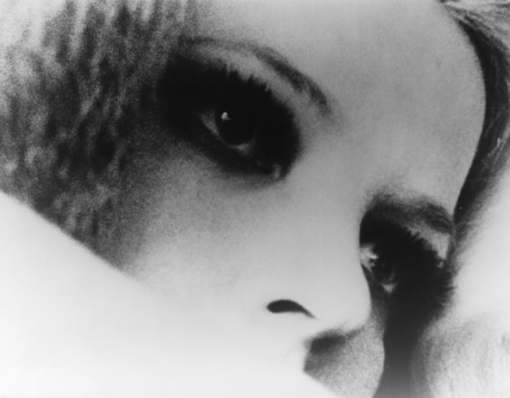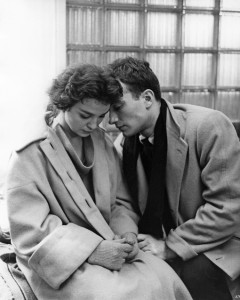Shadows (1959) 2012. GB. Blu-ray + DVD. 82 minutes (plus 30 minutes of extras). BFI Home Video. Certificate PG. Price: £19.99
+
Faces (1968). 2012. GB. Blu-ray + DVD. 130 minutes (plus 80 minutes of extras). BFI Home Video. Certificate 15. Price: £19.99
 About the Author: Dr Brian Hoyle lectures in film studies at the University of Dundee and is currently completing a monograph on the films of John Boorman and researching articles on Ken Russell and the Pre-Raphaelites; Music in the films of Powell and Pressburger and Benjamin Britten at the BBC. He has also recently contributed entries on 'British Art Cinema' and several key British art films to Intellect Press' forthcoming Directory of British Cinema.
E-mail: B.P.Hoyle@dundee.ac.uk
About the Author: Dr Brian Hoyle lectures in film studies at the University of Dundee and is currently completing a monograph on the films of John Boorman and researching articles on Ken Russell and the Pre-Raphaelites; Music in the films of Powell and Pressburger and Benjamin Britten at the BBC. He has also recently contributed entries on 'British Art Cinema' and several key British art films to Intellect Press' forthcoming Directory of British Cinema.
E-mail: B.P.Hoyle@dundee.ac.uk
... superb releases of two pivotal, uncompromising American movies
The British Film Institute (BFI) continues its commitment to high quality Dual Format releases with this pair of pioneering works by John Cassavetes, the father of American independent cinema. Although they were made almost a decade apart, Shadows (1959) and Faces (1968) are companion pieces of a kind. The earlier film, Cassavetes’ directorial debut, was a semi-professional experiment which grew out of a series of amateur workshops the actor organised in New York. Upon its release, the film’s use of Manhattan locations, jarring cuts and a bebop score, drew comparisons with the French New Wave. However, Shadows shares a kinship with the avant-garde works of American filmmakers such as Maya Deren, Stan Brakhage and Jonas Mekas. Indeed, Mekas called the first version of Shadows (released in 1958) a masterpiece and was incensed when Cassavetes shot new sequences and recut the film a year later (it is the director’s second, preferred version, that is included here).
Faces marked a return to independent filmmaking after two rather unhappy, but interesting, studio features, Two Late Blues (1961) and A Child is Waiting (1963). Like Shadows, this portrait of a failing marriage grew out of improvisations. However, the final film was largely scripted and the acting is simply in a different league to those in the earlier effort. Indeed, John Marley, Gena Rowland (the director’s wife), Lynn Carlin and Seymour Cassel give some of the most emotionally raw performances in American cinema. (The last two received Oscar nominations for their efforts, which was unprecedented for an independently made non-union film.) Further, while one hesitates to use the word ‘polished’ to describe a Cassavetes film, as his work thrives on rough edges, Shadows is notably more confident that its predecessor in every department. It was also a great popular success, which was instrumental in convincing Hollywood to (temporarily) stop making bloated spectacles and to concentrate on small, director-led films for adults.
Both films have been released on DVD before: by Criterion in America as part of a stunning 8 disk collection and in a similar package from Optimum in the UK. The extras on the BFI disk are largely carried over from these earlier versions and include a commentary with critic Tom Charity and actor Seymour Cassel on Shadows (which details the shooting process as well as the two versions of the film), an interview with Cassel on Faces, and an alternative opening for the later movie. The only substantial addition is an informative and affectionate conversation with Peter Falk, a Cassavetes regular, on the Shadows release. In order to optimise the quality of the Blu Ray, the extras have been limited to the DVD. It is a move that pays dividends. The standard definition DVD may not improve on the previous releases, but the high definition disc certainly does.
they can look noticeably grainy ... it serves as a pleasant reminder of the almost tactile texture of film stock
Both films were shot in 16mm black and white and blown up to 35mm for exhibition. As a result, they can look noticeably grainy. This is particularly the case with Shadows, and the Blu Ray transfer extenuates this. This should not be seen as a shortcoming, however. Indeed, it serves as a pleasant reminder of the almost tactile texture of film stock and the soft image makes a welcome change from the harsh sharpness one encounters on digital transfers of contemporary films. The image in Faces, on the other hand, is less consistent and alternates between grainy, over exposed passages and ones that are almost pristine. This is not a defect, however, or the result of poor mastering. Rather, it derives from the film’s experimental nature. In his conversation with Peter Bogdanovich, which is included as an optional commentary over the alternate opening of the film, co-producer / cinematographer Al Ruban reveals that he consciously employed a variety of film stocks during shooting and matched them to the mood of the scene. As a result, sequence by sequence, the look of Faces varies greatly in terms of grain and contrast. The new Blu Ray transfer makes these occasionally subtle changes of aesthetic more noticeable than ever, and they vindicate Ruban’s decision, giving the film a kind of expressionist quality which provides a fascinating counterpoint to Cassavetes’ naturalism.
Despite the relative lack of new features, the technical quality of the Blu Ray transfer should be enough to tempt Cassavetes fans who already own the film on DVD. However, it is a shame that the 1968 episode of the French television programme Cinèastes de notre temps, which profiles the making of Faces, is not included here. The episode, which was shot largely at the director’s home in Los Angeles, shows Cassavetes at his irrepressible best. He explains his DIY approach to filmmaking with great exuberance, dragging Ruban across a room to demonstrate the shooting of a makeshift tracking shot, and explaining that he paid for the film himself ‘on credit’. Additionally, Charles Kiselyak’s remarkable 200 minute profile of the filmmaker, A Constant Forge (2000), (included on the Criterion set), cries out for a British release. Perhaps the BFI will consider including these in the future, should they (hopefully) chose to release further Cassavetes titles. Nevertheless, these are still superb releases of two pivotal, uncompromising American movies.
Dr Brian Hoyle

